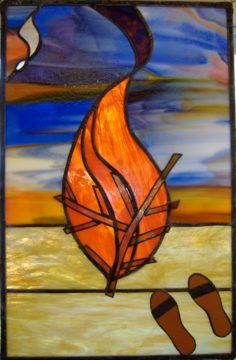
ב''ה
 Subscribe to our
Subscribe to ourFor translation of this page in Portuguese, click here: https://asknoah.org/essay/mensagem-das-dez-pragas
The Complete Unity and Unlimited Power of G-d
by Rabbi Moshe Weiner
author of: “Sheva Mitzvot HaShem”, “The Divine Code”, “Seven Gates of Righteous Knowledge”
| The Passover Haggadah text states about the Exodus from Egypt:
“The Holy One, blessed be He, did it in His glory by Himself! Thus it is said: ‘In that night I will pass through the land of Egypt, and I will smite every first-born … I, G-d.’ [Meaning] I and not an angel, I and not a seraph, I and not a messenger; … it is I, and no other!” A mistaken beliefThe mistaken concept of sheetuf (a “partner” with G-d) is the idea that there is an independent creation or being (for example, an angel) that functions independently of G-d. The verse (Deuteronomy 6:4) is a commandment for the Jewish people: “Hear O Israel, the L-rd our G-d, the L-rd is One.” The command is to believe and accept the truth that there is no independent existence other than G-d. Everything “else” is created and truly is only functioning according to G-d’s decree. The analogy is an ax that is used in the hands of a woodcutter. [1] The exception is a human being, who uniquely is given free will. A person is permitted by G-d to function as he likes.  How this relates to GentilesGentiles are not commanded that they must reject the false concept of a sheetuf (a “partner” with G-d). Nevertheless, a Gentile has no permission from G-d to worship some existence other than Him, that the person imagines to be a sheetuf. [2] One could imagine a sheetuf simply as a being that is independent from G-d. But that contradicts the verse “Hear O Israel, the L-rd our G-d, the L-rd is One.” One could also imagine a sheetuf that has an independent power over physical or spiritual matters. That contradicts the verse, “You shall not have for yourselves any other gods before Me” (Exodus 20:3). In either case, it is obvious that worshiping any type of sheetuf is idolatrous. It’s also obvious that thinking that an angel (for example) can function independently does not force one to worship it. Therefore, one who worships any sheetuf transgresses the universal prohibition of idolatry. One who thinks or believes that worship of a sheetuf is worthy conduct denies a fundamental principle of Torah faith. [3] This applies even if he does not actually worship a sheetuf himself. Mankind is even forbidden to worship a person, despite the fact that a person has a unique quality. Among the creations, only humans have free will, which even angels do not have. Footnotes[1] Note from the Director: One of the purposes for all of the Ten Plagues with which G-d struck the idolatrous ancient Egyptians was to teach them this truth, because they worshiped creatures in the physical world, and the “forces of nature” which they imagined were controlled by a host of independent deities. The Ten Plagues also impressed this idea upon the Israelites. They had been enslaved for several generations by the Egyptians, and many of them had become influenced by the idolatrous Egyptian culture. [2] This is a fundamental principle of the Noahide Code. See The Divine Code, Part II, Chapter 1. [3] See Rambam, Laws of Repentance 3:7, which states: “Five [individuals] are described as minim (deviant believers): (a) one who says there is no deity and no spiritual ruler of the universe; (b) one who accepts that there is a spiritual ruler, but maintains that there are two or more; (c) one who accepts that there is one master [of the universe], but maintains that [this master] has a body or form; (d) one who maintains that this [one master] alone was not the First Being and Creator of everything; (e) one who worships a star, constellation, or other [physical or spiritual] entity with the thought that it will be an advocate [or intermediary] between himself and the Master of the [physical and spiritual] worlds. Each of these five individuals is a min.” |